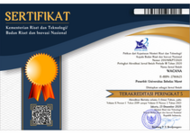Pengaruh Token Ekonomi Terhadap Pengurangan Perilaku Agresif Pada Siswa ADD di TK Inklusi PAS Baitul Qur’an Ponorogo
Abstract
Keywords
Full Text:
PDF (Bahasa Indonesia)References
Alwisol. (2018). Psikologi Kepribadian. Universitas Muhammadiyah Malang Pres.
Amalo, I. G., & Widiastuti, A. A. (2020). Pengaruh Penggunaan Token Ekonomi dalam Menurunkan Perilaku Disruptif Anak. Jurnal Obsesi : Jurnal Pendidikan Anak Usia Dini, 5(1), 500. https://doi.org/10.31004/obsesi.v5i1.622
Fahrudin, A. (2012). Teknik Ekonomi Token Dalam Pengubahan Perilaku Klien. Sosio Informa, 17(3), 139–143. https://doi.org/10.33007/inf.v17i3.80
Fitrah, R. (2020). Filial terapi dan token ekonomi untuk meningkatkan kemandirian menulis pada anak dengan problem kemandirian dalam belajar. Procedia : Studi Kasus Dan Intervensi Psikologi, 8(2), 56. https://doi.org/10.22219/procedia.v8i2.13423
Fitria, N., & Meiyuntariningsih, T. (2019). Pengaruh Token Ekonomi Untuk Mengurangi. 258–264.
Fraenkel, J. R., Wallen, N. E., & Hyun, H. H. (1993). How to design and evaluate research in education (Vol. 7). New York: McGraw-Hill.
Handayani, D., & Hidayah, N. (2014). Pengaruh Token Ekonomi Untk Mengurangi Agresivitas Pada Siswa Tk. Empathy : Jurnal Fakultas Psikologi, 2(2), 44–52.
Inastasya, I. (2020). Token economi untuk menurunkan perilaku agresif pada anak Gangguan Pemusatan Perhatian atau Hiperaktivitas. Procedia : Studi Kasus Dan Intervensi Psikologi, 6(1), 20–30. https://doi.org/10.22219/procedia.v6i1.12630
Isnawati, R. (2020). Cara Kreatif dalam Proses Belajar (Konsentrasi Belajar Pada Anak Gejala Gangguan Pemusatan Perhatian ADD) (T. Lestari (ed.); ke-1). CV.Jakad Media Publishing.
Lakoff, A. (2000). Adaptive will: The evolution of attention deficit disorder. Journal of the History of the Behavioral Sciences, 36(2), 149–169. https://doi.org/10.1002/(SICI)1520-6696(200021)36:2<149::AID-JHBS3>3.0.CO;2-9
Leblanc, L. A., Hagopian, L. P., & Maglieri, K. A. (2000). Use of a token economy to eliminate excessive inappropriate social behavior in an adult with developmental disabilities. Behavioral Interventions, 15(2), 135-143. https://doi.org/10.1002/(SICI)1099-078X(200004/06)15:2%3C135::AID-BIN51%3E3.0.CO;2-3
Zlomke, K., & Zlomke, L. (2003). Token economy plus self-monitoring to reduce disruptive classroom behaviors. The Behavior Analyst Today, 4(2), 177–182. https://doi.org/10.1037/h0100117
Maslim, R. (2013). Diagnosa Gangguan Jiwa Rujukan Ringkasan dari PPDGJ - III. In DIAGNOSIS GANGGUAN JIWA RUJUKAN RINGKAS dari PPDGJ - III dan DSM - 5. Bagian Ilmu Kedokteran Jiwa FK-Unika Atmajaya.
Nurdiyanto, M. F. H. (2021). Giving Positive Reinforcement to Reduce Aggressiveness in Children with ADD. Proceedings of The ICECRS, 8, 1–5. https://doi.org/10.21070/icecrs2020588
Rakhmawati, D., Nashori, F., & Uyun, Q. (2021). Efektivitas Modifikasi Perilaku Melalui Teknik Token Ekonomi Untuk Menurunkan Perilaku Conduct Disorder pada Remaja Putri. Jurnal Psikologi TALENTA, 6(2), 22. https://doi.org/10.26858/talenta.v6i2.19891
Saroha, I., & Marlina. (2018). Penggunaan Token Economic Untuk Mengurangi Perilaku. Jurnal Penelitian Pendidikan Kebutuhan Khusus, 6, 224–229.
Seminar, P., Lingkungan, N., Basah, L., Rapisa, D. R., Damastuti, E., Biasa, L., & Basry, J. H. (2020). Pengaruh Latihan Koordinasi Sensomotorik dalam Meningkatkan Kemampuan Pemusatan Perhatian pada Anak ADD (Attention Deficit Disorder) di PAUD Daerah Bantaran Sungai Kota Banjarmasin The Influence of Sensomotor Coordination Exercise in Improving the Abili. 5(April), 9–15.
Sugiyono. (2018). metode penelitian kuantitatif, kualitatif, dan R&D. ALFABETA.
Sumanto, J., Takeuchi, K., & Nakata, H. (2005). Pengantar Penelitian Dengan Subjek Tunggal. CRICED University of Tsukuba, 1–150.
Syahran, R., Lestari, M., Arifyadi, A., Konseling, B., & Tadulako, U. (2020). Teknik Kontrak Perilaku untuk Mengurangi Perilaku Agresif Non Verbal pada Siswa Sekolah Menengah Atas Pendahuluan. Teknik Kontrak Perilaku Untuk Mengurangi Perilaku Agresif Non Verbal Pada Siswa Sekolah Menengah Atas, 2(1), 26–31. https://doi.org/10.31960/konseling.v2i1.652
DOI: https://doi.org/10.20961/wacana.v15i1.63655
Refbacks
- There are currently no refbacks.
Copyright (c) 2023 Wacana

This work is licensed under a Creative Commons Attribution-ShareAlike 4.0 International License.
Jurnal WACANA
Fakultas Psikologi Universitas Sebelas Maret (UNS)
Gedung D Fakultas Psikologi
Jl. Ir. Sutami 36A Kentingan, Jebres, Surakarta Jawa Tengah 57126
email : wacana@mail.uns.ac.id






